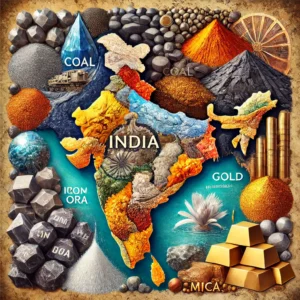- Lesson
- Quiz
Introduction: Soils of India for Competitive Exams
A deep understanding of the soils of India is essential for competitive exams, particularly for government jobs like UPSC, SSC, and state exams. The topic of soils often features in the geography section, where questions range from soil types to their characteristics, distribution, and agricultural importance.
This lesson covers the key information you need to know about Indian soils. Along with the content, we offer practice quizzes to help you prepare effectively for exams.
Major Soil Types in India: Key Information
- Alluvial Soil
- Distribution: Found in the river basins of northern and eastern India, especially in the Indo-Gangetic Plains.
- Characteristics: Fertile and rich in potash, phosphoric acid, and lime. It supports the cultivation of crops like rice, wheat, sugarcane, and pulses.
- Importance for Exams: Alluvial soil is a common topic in competitive exams, with questions often focusing on its location, properties, and crop suitability.
- Black Soil
- Distribution: Predominantly found in Maharashtra, Madhya Pradesh, Gujarat, and parts of Karnataka and Andhra Pradesh.
- Characteristics: Also known as Regur Soil, it is ideal for cotton cultivation. Black soil retains moisture and becomes sticky when wet.
- Exam Relevance: Expect questions on its composition, regions where it is found, and its agricultural significance, particularly for cotton.
- Red and Yellow Soil
- Distribution: Found in areas of low rainfall, primarily in eastern and southern India, including parts of Odisha, Chhattisgarh, and the Western Ghats.
- Characteristics: Rich in iron, which gives the soil its reddish color. However, it is low in nitrogen and humus.
- Important Facts for Exams: This soil type is frequently asked about in terms of its chemical properties and its suitability for crops like millet and groundnut.
- Laterite Soil
- Distribution: Commonly found in the hills of southern India, the Western Ghats, and parts of eastern India.
- Characteristics: Poor in fertility but rich in iron and aluminum. Suitable for crops like coffee, tea, and cashew when adequately irrigated.
- Exam Insight: Expect questions about its geographic distribution and its role in supporting plantation crops.
- Arid Soil
- Distribution: Found in the arid and semi-arid regions of Rajasthan, Gujarat, and parts of Haryana.
- Characteristics: Sandy, saline, and low in organic matter. Requires proper irrigation to be agriculturally productive.
- Exam Focus: Arid soils are often tested in the context of desert regions and the crops that can thrive with irrigation, such as barley and pulses.
- Mountain Soil
- Distribution: Found in hilly regions such as the Himalayas, northeastern India, and parts of Uttarakhand and Himachal Pradesh.
- Characteristics: Rich in organic matter but low in lime and potash. It supports the cultivation of tea, coffee, and fruits.
- Important for Exams: Questions may cover the unique properties of mountain soil and its role in plantation agriculture in hilly regions.
Importance of Soils in Competitive Exams
Knowledge of soil types is essential for geography questions in exams like UPSC, SSC, and state-level tests. You should be familiar with:
- Distribution: Understanding where each soil type is found in India.
- Characteristics: Key physical and chemical properties of soils, like moisture retention and fertility.
- Agricultural Relevance: Which crops are suitable for different soils and how soil management impacts farming practices.








1 thought on “Soils of India: Key Facts & 100+ Quiz Questions”